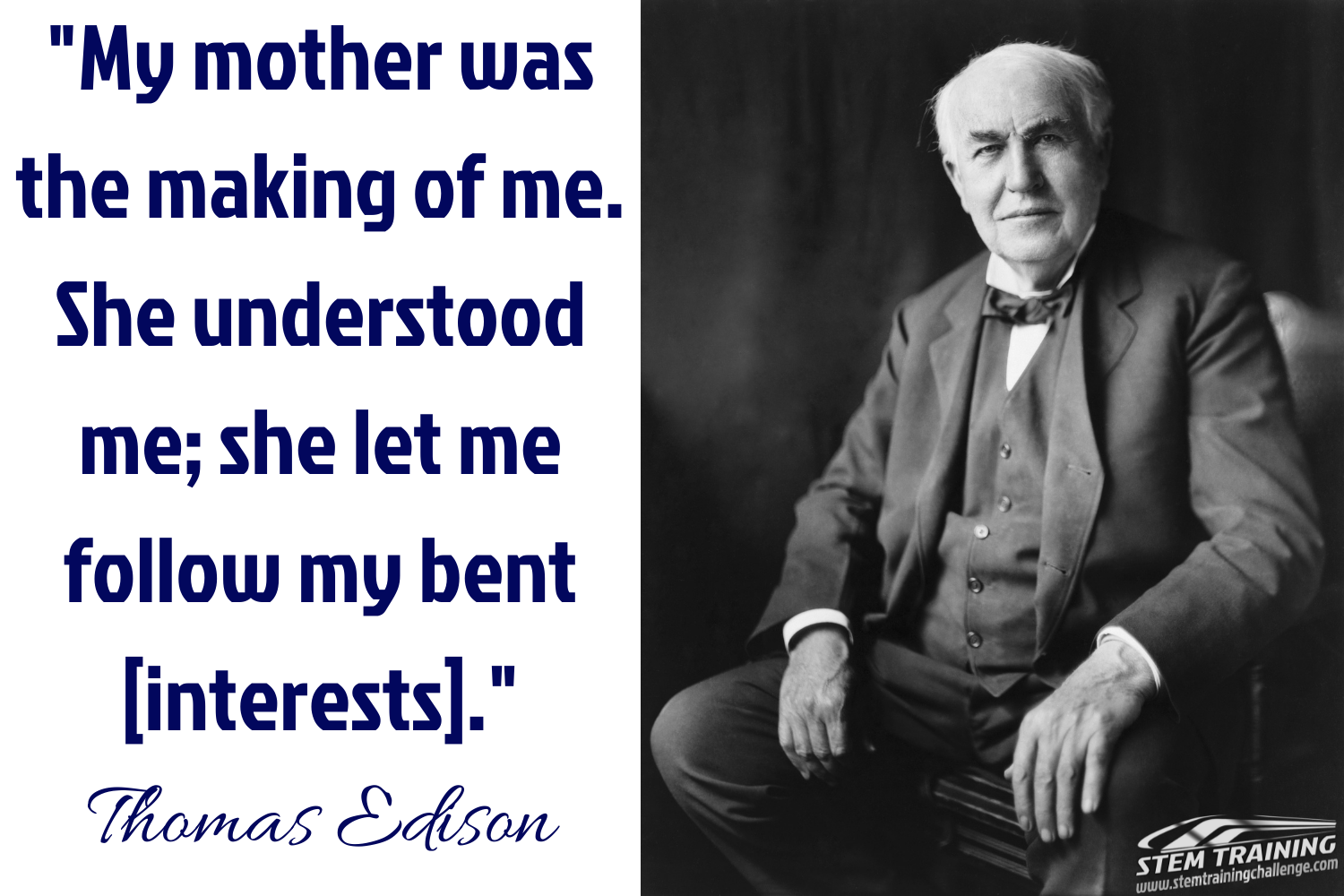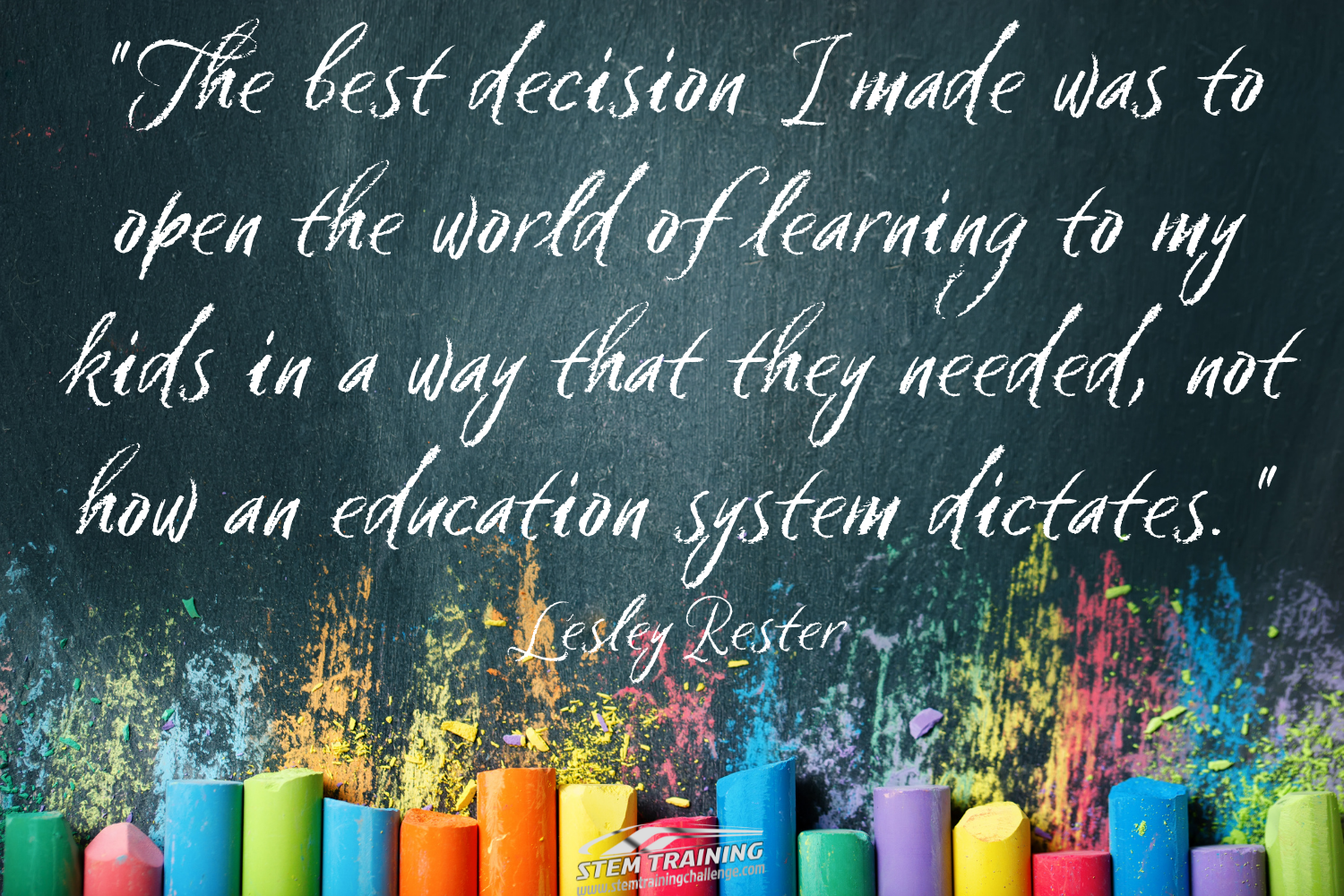
Do you have an Edison in the house?
- Posted by Coach Lesley
- Categories Blog, STEM Training
- Date April 26, 2022
Is there an Edison in your house?
First, let me start by saying, I am not a scientist or doctor, nor do I have a wall of diplomas and certificates. But, what I know, I’ve learned from over a decade of having an Edison living with me. Plus, I have had the privilege of spending one day a week, over the last few years, with many families that also have at least one Edison in their house. So, this is what I’ve learned and still learning about Edisons.
So, who is an Edison?
Well, you might have an Edison in your house if your kid is high-energy, non-stop, constantly in motion, and there is no in-between.
They are either asleep or full force awake. When my oldest was a baby, I realized this when he didn’t like naps and fought bedtime. He was so afraid to miss something. When we finally did get him to sleep, he would sleep through the night, no problem. He was my easiest baby in that way. When he was about 4 or 5, he told us, one night, he couldn’t sleep because “I can’t get his brain to shut off.” He’s also a night owl and would sleep until lunch if we let him. He just bypassed the little kid stage and went straight to a teenager there.
Sitting still is a form of torture to him; something must be in motion. He’s a kinesthetic learner. The Wikipedia definition is “a learning style in which learning takes place by the students carrying out physical activities, rather than listening to a lecture or watching demonstrations.”
I noticed this trend when we weren’t welcome at Toddler Story Time at the library. It said it was for toddlers that were walking. I assumed that they understood what that meant. At nine months old, his newfound skill meant all he wanted to do was walk around and explore. Sadly, they wanted sweet little quiet, non-moving toddlers to sit and listen to the story.
When I finally started investigating the concept of Kinesthetic learning, I found that making him sit on an exercise ball while listening to a story or even practicing his handwriting solved many problems. Interestingly, his handwriting actually improved as he bounced up and down.
You see, Edisons aren’t necessarily bad kids who don’t listen; it’s simply a case that it’s almost impossible for them to function sitting still. I know; I’m the same. I’d be standing in line with my mother and swaying side to side. “Lesley, stop swaying!” I would stop swaying but then start rocking because I had to be in motion. Finally, at 12 years old, someone told me to get a smooth rock, or Worry Stone as it’s called in Ireland, and rub it. It is an understatement to say I can’t sometimes function without it now. I have difficulty focusing when I am reading if I don’t have it.
You might have an Edison in your house if your kid comes up with well-thought-out, crazy ideas.
If you look at Edison’s life, he had big dreams. When he died, Edison left more than 3000 notebooks full of ideas, data, and comments on experiments. That’s not to mention 1093 patents.
Edisons are entrepreneurs. They are always dreaming of new schemes. Given a Lego set, they build it and then take it apart to make it do something more or something better. They think outside of the box. In fact, they probably turned the box into some sort of fort. My middle son gets excited when I get an Amazon delivery; he has already asked if he can use it before the package is opened.
You might have an Edison in your house if your kid is taking apart stuff to figure out how it works.
My youngest was doing this at a year old. I joke; this one little finger will get him into trouble. He will sit there and touch something, feel it, poke it, and examine it! The whole time he is in another world, all of his own! I can’t tell you how many times my other two kids have taken apart their toys and mutated them. My solution was to get it in Lego form because then, at least, it’s meant to be taken apart. I should have shares in superglue and duct tape by now and run my own toy repair company.
They also want to know about everything. Why does this do that? What makes it do this? Now yes, every kid is curious, but Edisons are amplified. They HAVE TO KNOW. Even if they will risk punishment to find the ‘why’ or ‘how’ or ‘what’. They will weigh the cost and do it anyway.
Thomas Edison, himself, was inclined this way. He famously set fire to the family barn to investigate the color of a really hot flame. Unfortunately, the same fire spread to the neighbors’ properties. His punishment was a public flogging in the town center.
It’s why these kids are sometimes seen as reckless. The need to know is so great it overrides common sense and a sense of danger.
You may have an Edison in the house if you have a strong-willed kid.
Strong-willed is not to be confused with undisciplined. I’ve seen some of the most well-behaved, disciplined kids undergo a complete personality change. They are simply triggered when something does not play out the way they see it in their head. This ties back into the other characteristics, like the need to be curious or their obsessive side.
You might have an Edison in the house if your child is obsessive about things.
My boys can tell you every make and model of construction equipment ever. Give them an equipment resale catalog, and they are happy for hours. But, please don’t mistake calling a front-end loader a digger around them; you will get a lesson about the difference. This is just one example, but with Edisons, they get their teeth into something with vice-like reflexes.
Thomas Edison’s obsessiveness lead to many of his significant breakthroughs. It was not unheard of for him to lock the laboratory door and tell his team that no one would be leaving until a solution was found. However, later in life, he realized not everyone had the same level of passion or commitment. This is a challenging issue for Edisons to live with.
You might have an Edison in your house if you have a kid with a raw talent that almost makes you sick.
Some things just come easily to them. For example, they develop fine motor skills fast, sit down at a piano, and it flows, teach themselves to read, and see how things work instantly.
Don’t get me wrong, you can have a kid with exceptional talent in one area, but in another, they struggle. No human is perfect at everything. But, when Edisons find their ‘thing,’ they thrive.
So why do I call them Edisons?
My boys struggle with reading, which seems to be more common than you realize. It makes me wonder if it’s not that some kids develop at different levels. The ‘have to read by Kindergarten’ standards are not beneficial to kids. The research is starting to prove this. I would love to see what would happen if schools introduced Maker Labs for struggling readers instead of remedial reading classes. It would be interesting to see how much over a year or two, that would affect not only a child’s ability to read but also their self-esteem.
In my research on their reading challenges, I read a book entitled Dreamers, Discoverers, and Dynamos by Lucy Jo Palladino. She had initially called it the Edison Trait. That was when I first learned about Edison’s learning difficulties. Dr. Palladino presents such a favorable view of these kids.
On my home-education journey, especially as I have adopted a STEM approach, the life of Thomas Edison came across my path again. I find the man fascinating. He was probably one of the most influential innovators and inventors to live. As I read his biography to my boys, we learned a lot from his life, and my boys found him ‘heroic’ to look up to.
The Original STEM Student
He was labeled ‘addled’ by his headmaster, or ADHD in modern terms. His mother never accepted this label. I know some of you, home-educating parents, reading this can probably relate, and you home educate for the same reason Nancy Edison did. As I read about his early years, I realized he was the original STEM kid. Nancy created an environment similar to the one that I am trying to make for my boys. Well, we can see that what she did, worked.
Thomas Edison’s mother had the wisdom to pull Thomas out of school and let him study through child-directed learning. Had she not, we may have waited many more decades, if not centuries, for the invention and innovation of things that evolved to make our modern lives possible.

Today’s Edisons
I often wonder how many Edisons sit in classrooms, labeled incorrectly—forced to conform to an education system not designed for how they learn. Do they ever reach their full potential? Or by 18 years old, when they graduate, are they so used to being ‘labeled’ that they have accepted they will never excel?
I live with Edisons, each different in their level of qualities, but then each child is unique. I am learning that the world is a lot less stressful and frustrating when I turn the focus of their education to their needs and interests.
Mr. Edison said of his mother, “My mother was the making of me. She understood me; she let me follow my bent [interests].” I hope that when my days as a home educator are over, my boys will say the same of me, and they will step into their careers with all the tools they need.
The best decision I made was to open the world of learning to my kids in a way that they needed, not how an education system dictates.

You may also like

What to do with an Edison?

Why are you educating your child?


1 Comment